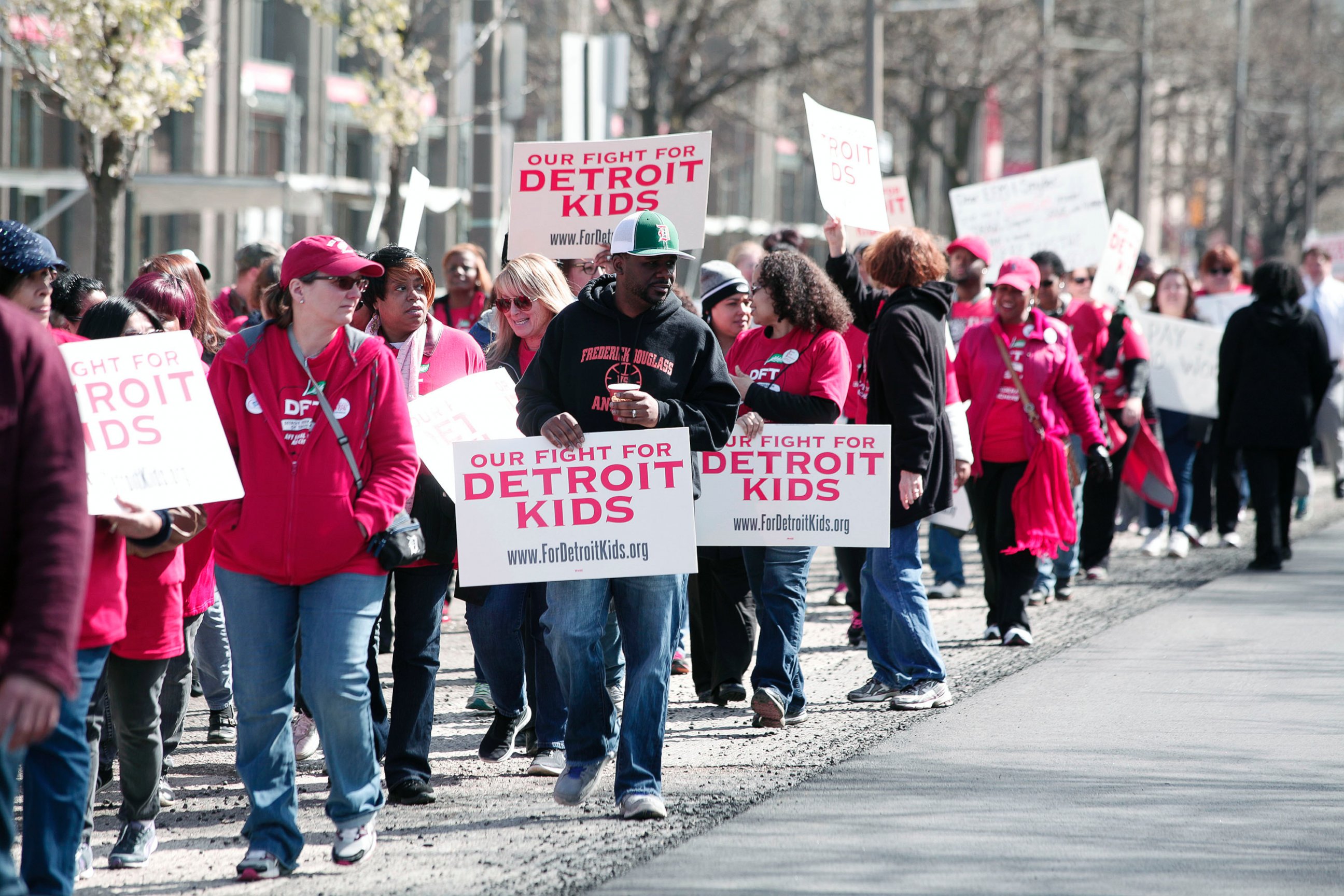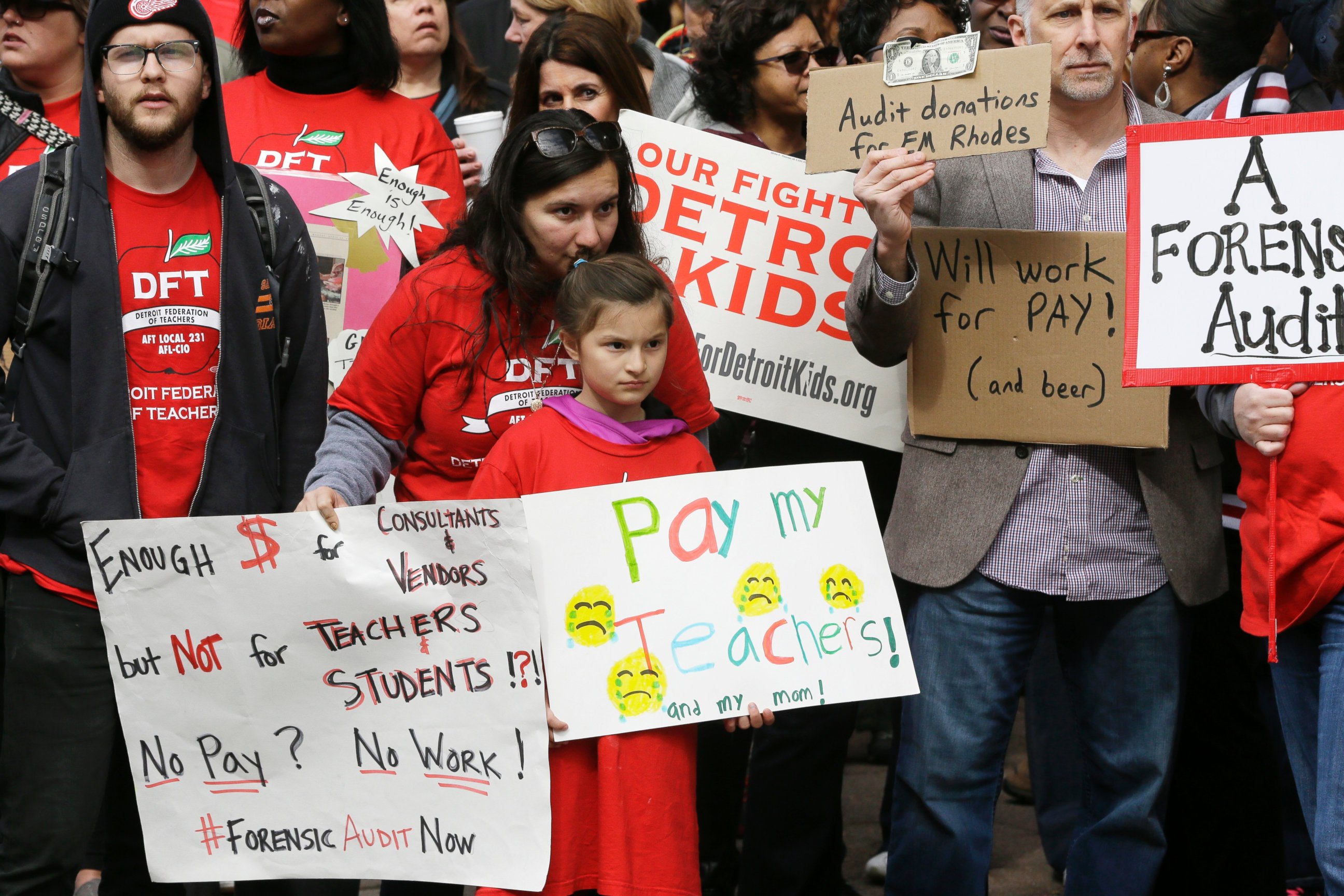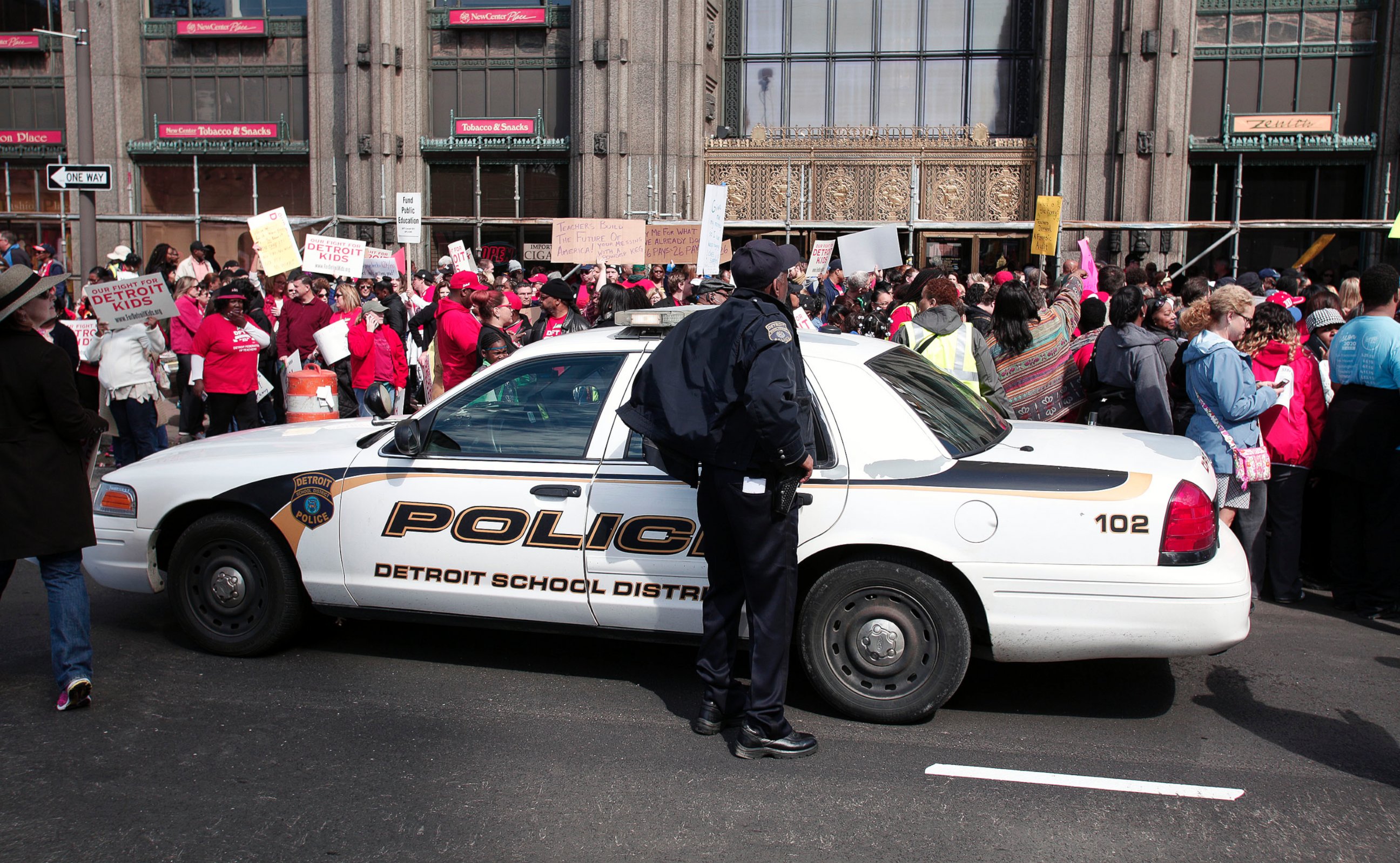Detroit Teacher Explains What's at Stake as Schools Close Again Due to 'Sick Out'
"Teachers are not going to work without being paid," one teacher said.
— -- Detroit teachers are taking to the streets instead of classrooms for the second day of a "sick out" rally in a fight for paychecks.
Kendra Lincourt, an art teacher who has worked at Detroit Public Schools for 17 years, participated in the rallies, both on Monday and today.
"People need to realize that teachers are not going to work without being paid," Lincourt told ABC News today. "I love my job. I want to continue to do my job, but I'm not going to do it for free. I have a family I need to support."
Lincourt said her husband is also a teacher but not with Detroit public schools.
"We're not trying to be selfish by any means," she said. "It's our passion, but it's also our job, it's how we live. We're not asking for anything that we don't deserve."
Today, 94 of 97 schools in the Detroit Public School district are closed, impacting 45,726 students, according to school officials.
A spokeswoman for the district said the three remaining schools had enough teachers report to work. The district closed schools where 40 percent or more of the teaching staff called in sick, the spokeswoman said.
Monday's "sick out" also closed 94 schools, impacting 45,628 students. The sick out is ongoing "because we still don't have assurance that we're going to be paid," Detroit Federation of Teachers interim President Ivy Bailey told ABC News today.
"We were hoping yesterday would be the last day," Bailey said, adding that teachers were telling her they miss their students.

Lincourt said it's unfortunate that the school closures are causing last-minute child care problems for parents.
"We do feel for the parents," she said. "At our school we're fortunate that we have a lot of parental support. They understand that nobody is going to work without being paid"
And as for her own three daughters, who attend the school where she teachers, they went along to the rallies, Lincourt said. While her children are missing class time, Lincourt said the rallies provided "amazing connections." She said one daughter, a 4th-grader, likened marching down the middle of a Detroit road to her studies about Martin Luther King.
When the "sick out" began Monday, Bailey explained to ABC News the reason behind it. Because teachers do not get paid during the summer, some teachers are on 26 pay periods. "They take their salary and they pro-rate it throughout the year [with] additional pay periods in the summer, so they can get paid over the summer," she said.
She explained that the state gave the district $48.7 million to get through the rest of the school year but that did not include money to cover summer payments.
"When we figured out what was going on and looked at the payments of those teachers, technically Thursday of last week is the last day that they're actually being paid," Bailey said.
"In theory, they're working without pay," she said. "There's no guarantee -- based on what the district has told us -- that they will receive payment after June 30, which is not fair. No one should work for free."

In Detroit, where the economy has been struggling for years, schools are currently under a state of financial emergency and are run by an emergency manager instead of a school board and superintendent.
"If you are an emergency manager and you're supposed to be the person who came here to straighten out our finances, and now they're worse than they ever were ... I believe we have every right to be upset. And there is no accountability for what has gone on with these emergency mangers," she said.
"The teachers feel, and I feel, that no one is listening to us," Bailey said. "The teachers are not only fighting for themselves, but more importantly, they're fighting for their students."
Mechelle Doty, a school psychologist for the district, told ABC News today that staff members "would like nothing better than being able to serve the students. But we just want what's fair."
"Anyone in any work place ... expects compensation," she said. "We have bills, we have families, we have responsibilities just like anyone else who has a job. We're just really asking for fairness and what's due."

Doty said she's not sure if she'll go back to school Wednesday.
"It's a day-to-day approach," she said. "We are showing what our concerns are and we're waiting for a response. And we're really waiting to see if the funding that is necessary for the education of the district, if that's going to be approved."
Today also happens to be National Teacher Appreciation Day, a part of Teacher Appreciation Week. Bailey said the timing is a coincidence.
"I did tell teachers 'Happy Appreciation Day,'" Bailey said. "It's kind of ironic."
Detroit Public Schools DPS Transition Manager Steven Rhodes did not immediately issue a statement on the second day of the "sick out," but he said Monday, "I am on record as saying that I cannot in good conscience ask anyone to work without pay."
"Nevertheless, it breaks my heart to think about the major impact that the closure of 94 of the district’s 97 schools is having on our students and their families," Rhodes said Monday, also noting that "families were forced to try to find a way to unexpectedly care for their students" and "many parents may have been forced to take a day off from work without pay." He also mentioned that some students rely on school for meals.
"Apart from the toll this is taking on our students and their families, of closing 94 schools, District funding will also be impacted -- at a time when we can least afford it," he said. "Today’s school closure action encouraged by the DFT may cost the District approximately $2 million in state aid. That amount of funding equates to the cost of hiring roughly 20 teachers. The loss of these funds also does nothing to help the district address the serious issues that we have all been working to address, including teacher/student ratios and smaller class sizes, as well as improving the quality of the learning environment in our schools."
Rhodes said he "can make no guarantees, but it is clear that the Michigan Legislature understands the urgency of this situation and will act in a timely manner to ensure that operations of the school district continues uninterrupted."
He said he will continue to work with Lansing policy makers to "help them understand how critical the passage of the legislation before them is not only to the future of Detroit Public Schools, but also to the future of the city of Detroit."
"Without this legislation, Detroit Public Schools will not be able to operate after June 30, 2016," Rhodes said.



